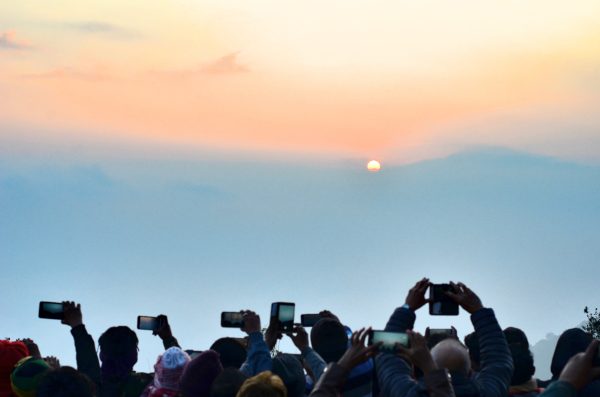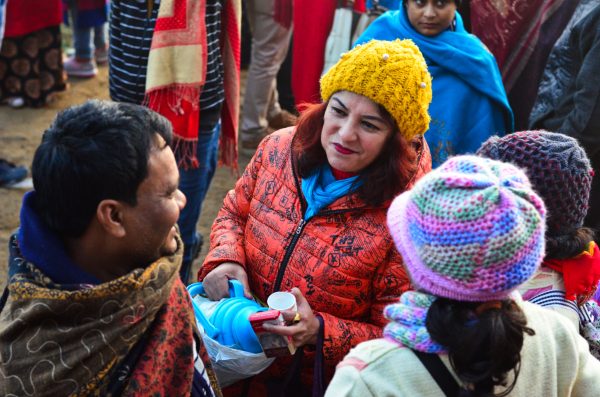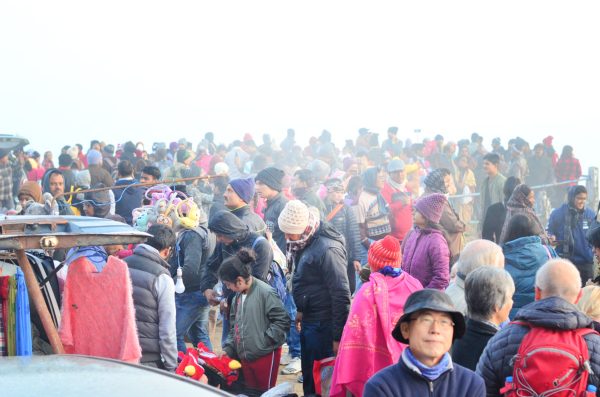It was four in the morning and we were slowly making our way through the dark lobby of our hotel to go outside. There were two dark figures, probably the night-shift receptionist and another person presumably to attend calls to housekeeping, snoring without a care on the sofa there. As we stepped out and breathed in the early morning air without the diesel fumes that envelop Darjeeling throughout the day, I whispered, ‘I wonder if the sun rays bouncing off Kanchenjunga can really be captured on the dslr.’
‘Or by the smartphone,’ added Specky, my wife, ‘not everyone carries a heavy ungainly camera like you do.’
Our cab reached us soon enough and in less than a few minutes I realized that the entire way ahead was full of cabs spewing diesel fumes making strange voodoo patterns in the beams of headlights spearing the darkness. Our experience at the top of Tiger Hill began with a lot of jostling with crowds in a hurry and ended with a sullen sun unwilling to peep through the dense clouds that morning. In between these two experiences were aggressive locals thrusting miniature cups of tepid and tasteless overpriced coffee, shouts of sellers bullying tourists to buy cheap caps, pullovers, and shawls or get ill for the rest of their trip, kids bawling because they could see nothing but dark silhouettes, and almost everyone falling over something or the other.
‘Tiger Hill is a mess,’ I said, ‘and excessive tourism is embarrassing the sun because it is now afraid to even peep out.’
The truth is that tourism today is nothing but a deadly sin. Our trip to Darjeeling is just one sad example. Wherever we went all we could see were heads of people under a massive canopy of smartphones. It is all about click, click, click… and then off in a cab to some other place to click, click, and click! No, we didn’t follow this dictum at all. We had decided to walk from our hotel to the zoo there and then down the hill to the tea estate on one day. The next day we walked to the pagoda and stopped to talk to the locals to ask them the way to the eateries that they prefer… and so we stumbled upon a few charming places where we tasted the best momos in Darjeeling. I must mention here that we found not even one tourist walking around except on the mall road.
If travel wasn’t just another word in a dictionary, it would be redefining aggression for all of us. I have begun noticing that travel is getting vocally aggressive, outlandishly bossy, and the image I now carry of it resembles Lalita Pawar, the vamp prodigy who must have troubled more bahus in Hindi films than anyone else anywhere on earth. Just look at the way travel and tourism fundas shout at soft-spoken and timid-looking tourists who cannot understand in the first place why they had decided to come wherever they now happen to be…
‘Don’t you dare to litter here…’
‘Shut that young brat of yours, this is a silence zone in the temple (or even a monastery or a church for that matter)…’
‘Hurry up, hurry up, there are hundreds of others waiting to eat puchkas here that are anyway not as good as the ones in your town, but then, you’re here to enjoy…’
‘Stop staring at your bill. This is a hill station (or a beach, or a forest reserve) and everything costs more, baba…’
‘No normal booking here. Contact the tout…’
‘Bad quality? High price? Then don’t buy this cap (or hat or shades or gloves or shawls or snow-boots or walking sticks) and go back sniffling (or sun-burnt or blinded or chilled to the bone or teary-eyed)…’
Despite all this, the travel enthusiast like me goes on and explores known and unknown aspects of any place with a smile. But the fact remains that excessive tourism is creating massive heaps of urban ruins. Shimla, Mussorie, Manali, Darjeeling, Goa, and hundreds of other charming cities are now literally buried under hurriedly constructed hotels and are run-over by cabs wanting to drive you everywhere. There are hundreds of make-shift kiosks selling water and munchies in throw-away single-use plastic everywhere and the bins perpetually remain out-of-sight as if saying, ‘I am in a government job now and am relaxing.’
Disruption and excessive tourism go hand-in-hand. The local ethos adopts a secondary role in every aspect. I was in Shillong a few years back and noticed that one could eat everything from chaat to chicken in the market but one had go searching desperately if one wanted to have Khasi food. Isn’t this pathetic? This isn’t the sort of positive disruption that one expects from a boost to tourism… but this is exactly what always happens. Everything local gets relegated to special programs and displays… or happens only because of personal initiative. The natural evolution of a culture recedes into a fearful stance intimidated by the glitz and glamour of multiple cultures rushing in en-masse.
It isn’t as if tourism is bad for local sustenance. What exerts a bad and debilitating influence is when the rush of tourists becomes overwhelming… this brings in a mind-set that promotes a hurriedly assembled mediocrity in everything. This spells a doom for local aesthetics, local culture, and even local habits that are invariably not accustomed to being rushed. After all they are what they are because of centuries of slow-paced evolution and all this has to be restructured to be able to manage a massive onrush of tourists. More often than not, this results in either everything local taking a backseat or forcibly adopting stances that are shabby clones lacking vision.
Is there a solution to such issues?
I guess regulated tourism is what must be enforced everywhere… this obviously will spell an end to the long weekend rushes that folks in big cities have started loving, but will save our tourism. If this doesn’t happen, tourism is sure to move from being a deadly sin to becoming deadlier and then deadliest sooner than you expect such things to happen.
.
.
.
.
.
.
Arvind Passey
12 December 2018












10 comments
Renuka Walter says:
Dec 12, 2018
Tourism is inevitable! I’m okay with it as long as people don’t kill the true essence of a place. I mean please don’t throw garbage here and there! Please don’t start a shop near a temple or a church! Don’t build that tasteless fencing around a heritage site!
Arvind Passey says:
Dec 13, 2018
Yes, as things stand today, tourism is inevitable… but we do not yet know how things may change in the future. Responsible tourism isn’t just about not littering or ugly architecture but also about the carbon footprint that every tourist leaves. There are then issues surrounding conservation of the environment, pollution (now this is inevitable with excessive tourism), degradation of indigenous culture and traditions and many more.
Preeti Chauhan says:
Dec 13, 2018
The concept of responsible tourism is catching on slowly and sometimes I feel guilty too about my touring,as I change the ecology with my flying and my demand for luxury even in a forest or a hill.
Arvind Passey says:
Dec 13, 2018
Even a realisation that the way we are changing the definition of tourism is a good first step. 🙂
Thanks for reading this post and commenting. Do visit again.
Bikram Chakraborty says:
Dec 24, 2018
Maybe we should learn from Bhutan in this matter. The way they manage tourism (and tourists) may be emulated in our tourist centers. We should learn from this small nation the way they manage it.
Arvind Passey says:
Dec 24, 2018
True. One of the steps they have taken is to limit the number of tourists and make their stay really expensive. They have allowed Indians without their cess… maybe they need to charging us too.
Political will will be needed in loads if this is to be done the same way in India.
Shilpi Dutta says:
Dec 24, 2018
Well what to say. People don’t respect the place they visit. So do the brands who can easily install water ATMs instead of selling single use plastic bottles. But then why would they care. They are minting money, tourists are wasting money and the planet is turning into a dustbin.
Arvind Passey says:
Dec 24, 2018
Yes, the planet is indeed turning into a bin… and the tourism boom in India is a major contributor.
Kamayani Upadhyay Mishra says:
Jan 4, 2019
I so agree with your writing. People don’t travel for themselves now, rather they travel to show others on various social networking sites.Hence all the time and effort is wasted on click, click, click. People don’t take interest to learn about the location, culture, people, lifestyle, thinking. These are the essence of any travel.
Its important to remember that you can either just click a pic/video OR enjoy the location. Choice is ours.
Arvind Passey says:
Jan 4, 2019
Informed travel and travel to learn more need to coexist. Photography isn’t an outright evil but being obsessed with clicking at the cost of missing out on the wonders that need to first connect with a person’s heart and mind can be given a miss.
Thanks for reading this post and commenting, Kamayani. Do visit my blog again. 🙂